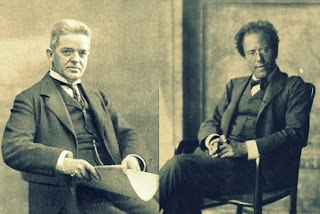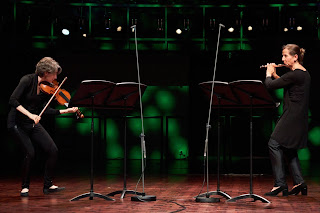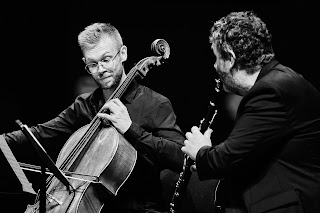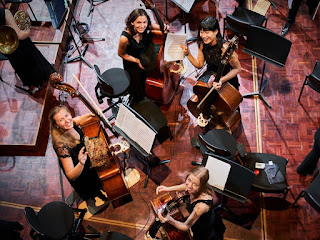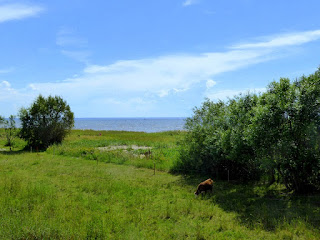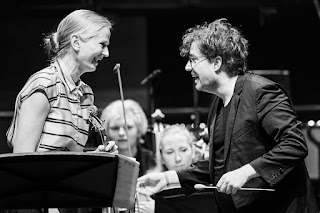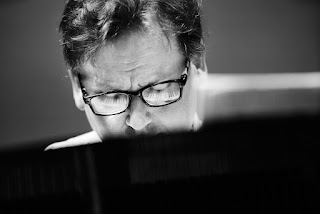My good friend and
visionary artist-photographer Kaupo Kikkas took so many inspired shots at this year's brilliantly successful festival in Estonia's summer capital, and I could only include a few in my
Arts Desk eulogy. So to rekindle what seems as each day passes ever more like an unreal experience - that it all happened and that I got to go both feel miraculous - I thought I'd interweave his photos with my own from the time I spent along the eight-mile white sand bay and the river. These mostly come from the single day when I wasn't in town attending rehearsals or meeting friends, and I'll take them in order.
A heatwave was holding up for the first couple of days, and the main beach was packed - Estonians could do this, as within their country they've kept healthy and observed the lockdown as well as the border closings as prophylactics, rather than to stop the disease spreading further.
As a self-distancing foreigner, but by inclination anyway, I headed east to where the dunes begin to take over.
Now we'll do a three-by-three format. Over to the musicians: up top, the double-bass quartet, from left clockwise Regina Udod, Juliane Bruckmann, Angie Liang, Siret Lust. That in fact is the perfect disposition in terms of how the Estonian Festival Orchestra was originally conceived: two players from a top western orchestra (Bruckmann from Paavo's Deutsche Kammerphilharmonie Bremen, Liang a regular in the La Scala Orchestra, and based in Milan), two Estonians (though Siret now has, or had until the shutdown, quite a career playing in several London orchestras).
Paavo Järvi should now light the way. I was so impressed, when I watched the film of the new Tõnu Kõrvits work, To the Moonlight, by his clairvoyance which clearly guided this impressionistic dream-world. Kaupo has captured that here.
The undisputed star of the four concerts I heard was young Theodor Sink, and the work he played - Lepo Sumera's Cello Concerto really is a neglected masterpiece (see the Arts Desk review for more on that).
First night standing ovation. Should have really happened for the Sumera, but had to wait until the encores.
Beach 2 That baking morning, I wanted to swim, but first to do a circuit of the boardwalk around the eastern nature reserve (the western one is more secluded). Some of the cows who help to 'manage' the landscape were sheltering under a willow tree
while one was grazing the other side of the boardwalk.
The water's surface was covered with damselflies and dragonflies, but in flight they don't catch, so here's a broader perspective.
KK 2 From the chamber gala: a close up of two out of five in Hasenöhrl's much-snippeting arrangement/deconstruction of Strauss's Till Eulenspiegel [Einmal Anders], both peerless in their solos: Emma Yoon and Alec Frank-Gemmill;
and the full ensemble, also featuring Juliane Bruckmann, Rie Koyama and Signe Sõmer, a real match for her fellow clarinettist in terms of personality.
Next came Maarika Järvi, taking over the violin line on flute, Giorgios Katsouris and Teet Järvi in Schubert's String Trio in B flat major:
Beach 3 My bathing spot, as far as you can get heading towards Latvia before the reeds take over.
The only snag is that while the waters of the bay are perfect for kids, you have to wade a long way out before you can swim, and even then the sandbanks rise in places. I actually walked back for most of the way in the shallow waters parallel to the beach, observing the cumulus clouds massing inland - a storm would not hit us until the next morning -
and looking fondly back over the expanse where nature truly takes over.
KK 3 More from the chamber gala: the super-elegant and friendly Triin Ruubel and Matt Hunt reprise their brilliant interpretation of Bartók's Contrasts, previously shared with my now very good friend Sophia Rahman - she had arranged a performance of Messiaen's Quartet for the End of Time with Matt, which the festival couldn't accommodate, so they did it up at the beautiful Arvo Pärt Centre on the Lohusalu Peninsula - but now with the star of the next day Olli Mustonen.
Top that? Well, nothing could, but the Mendelssohn Octet matched it. What came to mind as Florian Donderer led a performance of supernatural airborne grace was my friend Anthony Gardner's first novel, The Rivers of Heaven, describing in visionary terms the life of a child in a parallel world before it's born. Mendelssohn was very young when he wrote this, but the music still somes to come from somewhere else.
Especially striking here were the contributions of Eva Bindere and young Hans Christian Aavik, clearly the latest Estonian prodigy. Here they are playing in the EFO with Florian.
The other players are also outstanding: Mari Poll, Xandi van Dijk, Karin Sarv, Thomas Ruge and the very busy Sink.
Beach/river 3 Long evening concerts and revelry thereafter usually rule sunsets out. But this time I caught one late afternoon (ie 6.30-7.30) stroll out to the stone jetty at the west end of the beach and one sunset, simply because the adored Passion Cafe is too hugger-mugger inside for a Brit to risk spreading possible infection, and it soon got too cold to sit out (I did see the lovely host Maarika at the final concert, and amused her by hailing her in hybrid terms as 'Madame La Passione'. Adorable lady). Thus flotsam on the edge of the west-end nature reserve.
and where, beneath the board walk, the sand meets the reeds
with the view across the river to the wood factory and a bank of gulls.
KK 4 The final concert of the Järvi Academy Youth Symphony Orchestra featuring 12 conducting participants of the Academy Course reached the usual high standards in playing, alongside tellingly varied results from the conductors. Inevitable highlight was Berlin Philharmonic principal horn-player Stefan Dohr in Mozart's Third Horn Concerto (pictured here with young conductor Jaan Ots).
His Messiaen encore was stunning, his conducting not so (I've written about this on the Arts Desk feature). Xandi was just right, I think, for the tender lyricism of the Adagio in Dvořák's Sixth Symphony. I wish I'd been there for his earlier collaboration with Triin Ruubel and the Academy Sinfonietta in Erkki-Sven Tüür's Second Violin Concerto, "Angel's Share"; it's so impressive in the film. Here they are together.
As I wrote in the Arts Desk piece, it wouldn't be fair to choose a "winner" from the student conductors, though I was happy to note the huge improvement in the technique and presence of the delightful Nele Erastus. I used Kaupo's picture of her over there, so let's see former Prima Ballerina Maria Seletskaja in confident action (she first made her mark at last year's festival).
Beach/river 4 Now we're at my sunset stroll after the chamber concert, when the fading light was beckoning. The sun actually went down before I got to the mouth of the river - I hastily caught its last appearance.
This time the ducks which hang around this bank of the river - Eiders, I thought at first, but there was no evidence of the melancholy whooping - were more in evidence.
So out to the beach, with views across to the stone jetty and the headland with the solitary tree where the cattle usually graze.
KK 5 Many of Kaupo's best portraits were gathered at the rehearsal before the second EFO concert as well as its aftermath. How well he's captured the watchfulness, intelligence and humanity of the players. I love this shot of oboist Jose Luis Garcia Vegara.
Siret in action.
And of course the money shot of Olli Mustonen with keyboard lashes (best enlarged).
Beach/river 5 Out to sea,
across the river mouth
and towards the dunes.
KK 6 Paavo in action with the most joyous and also the most fine-tuned Mozart 39 I've ever heard,
Matt sharing a joke with Signe - two clarinettists of great character - with Maarika and Paul Suss in front of them.
And a final salute between players who would so love to have hugged and kissed at the end as they usually do.
Beach/people 6 At the west end, before the mosquitoes got too much.
Plus two happy people pics of my own: interval drinks with Jonathan Bloxham, erstwhile cellist in the orchestra, conducting trainee and now well into his international career as a conductor, Alec Frank-Gemmill, new principal conductor of the Estonian National Symphony Orchestra Olari Elts and his son;
and just before the last concert I attended, lifeblood of festival admin and former contrabassoonist in the orchestra Tea Tuhkur - now heading to a new job with the Lucerne Symphony Orchestra - and Maarit Kangron, cellist and agent with IMG Artists, staying in Estonia for the foreseeable future.
A final sunset from the concert-hall windows in the interval
and sunrise from my hotel room on the morning of departure.
One last shot from Kaupo, of Olli Mustonen and Matt after their Bartók. Roll on 2021, but I think we've all had our vision.
